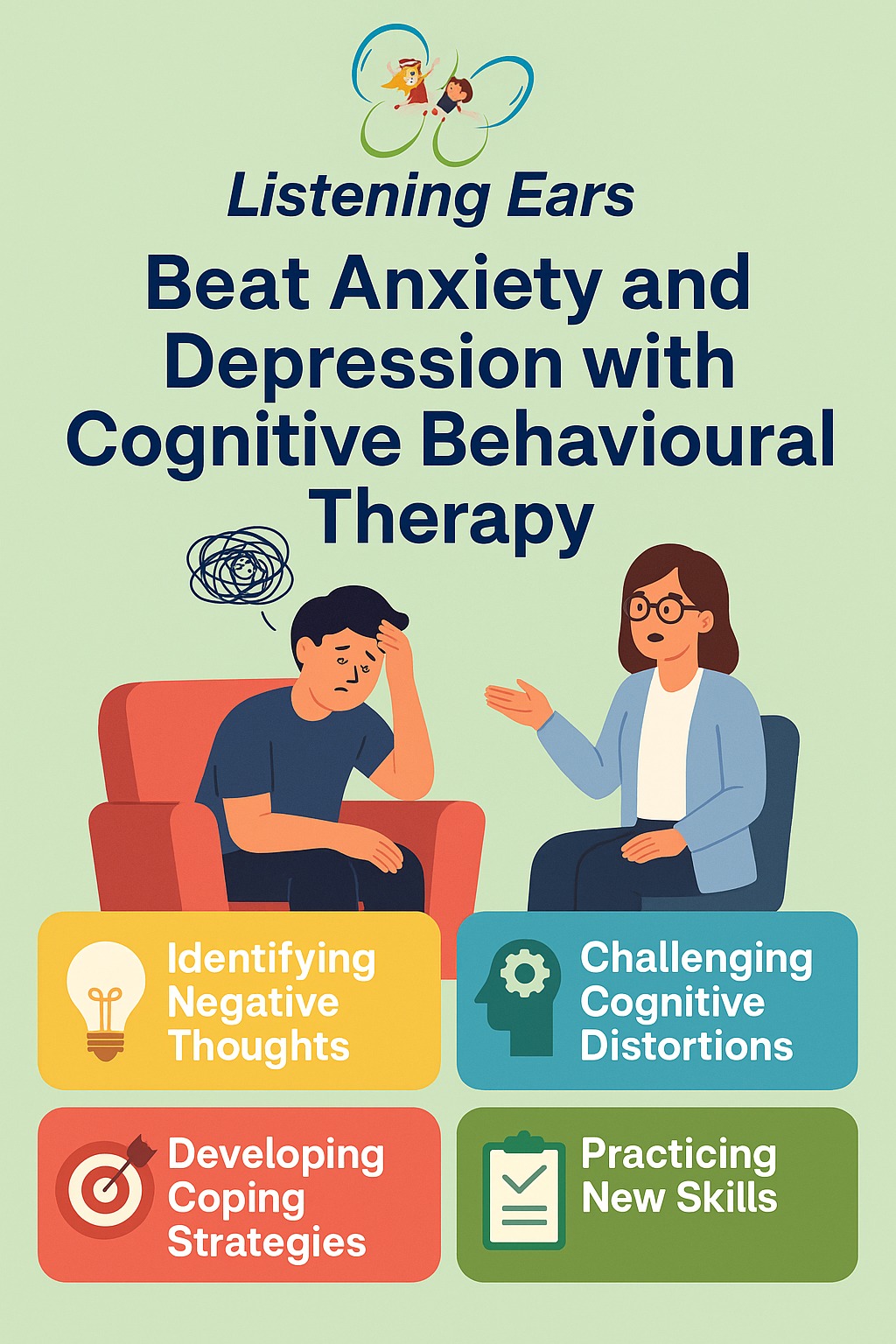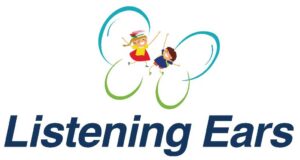Cognitive Behavioural Therapy helps people manage their worries and negative thoughts so they can feel calmer and happier. Studies show that CBT can improve symptoms in 50%–75% of people with anxiety or depression when practiced with a trained therapist. Experts in psychology explain that CBT works by teaching simple techniques to recognize negative thoughts, replace them with positive ones, and build healthy habits, making it easier to cope with daily stress. With regular practice, anyone—even kids learning coping skills—can benefit and feel more confident.
Why Mental Health Matters for Kids with Hearing Loss
A child’s happiness and success in life depend a lot on their mental health. Children with hearing loss can sometimes feel sad, anxious, or frustrated without warning. Studies show that about 20% of children with hearing difficulties experience anxiety or depression at some point.
These negative feelings can happen because a child may wrongly think that struggling with school or communication means they are not smart or capable. It’s important to help them think positively before these worries become bigger problems.

Cognitive Behavioural Therapy helps people manage their worries and negative thoughts so they can feel calmer and happier. Studies show that CBT can improve symptoms in 50%–75% of people with anxiety or depression when practiced with a trained therapist. Experts in psychology explain that CBT works by teaching simple techniques to recognize negative thoughts, replace them with positive ones, and build healthy habits, making it easier to cope with daily stress. With regular practice, anyone—even kids learning coping skills—can benefit and feel more confident.
Why Mental Health Matters for Kids with Hearing Loss
A child’s happiness and success in life depend a lot on their mental health. Children with hearing loss can sometimes feel sad, anxious, or frustrated without warning. Studies show that about 20% of children with hearing difficulties experience anxiety or depression at some point.
These negative feelings can happen because a child may wrongly think that struggling with school or communication means they are not smart or capable. It’s important to help them think positively before these worries become bigger problems.
What Is CBT for Kids?
Cognitive Behavioral Therapy (CBT) is a type of therapy that helps kids feel happier and solve problems by teaching them how to think differently and act in healthier ways. The best part is that CBT is usually short-term — children often see results in 5–10 months of therapy.
CBT combines talking with practical activities that help children change how they react to challenges. For example, a child learns to replace thoughts like “I can’t do this” with “I can try my best.”
How CBT Helps Children with Hearing Loss
CBT can be especially helpful for children with hearing loss because it addresses frustration, low confidence, and social challenges. Children learn practical ways to:
- Stay calm when things are difficult
- Ask for help without feeling embarrassed
- Communicate more confidently with teachers and friends
- Solve problems step by step
Studies show that children who receive CBT early are more likely to improve both socially and academically compared to children who don’t receive support.
Here’s a comparison table ready to copy and paste into Google Docs:
Cognitive Behavioural Therapy (CBT) for Children – Comparison Table
| Aspect | Without CBT Support | With CBT Support |
| Thought Patterns | Negative thinking like “I can’t do this” or “I’m not smart enough” | Learns to replace negative thoughts with positive ones like “I can try my best” |
| Anxiety & Stress Management | Feelings of worry, frustration, or being overwhelmed | Develops practical strategies to stay calm and manage stress effectively |
| Confidence Levels | Low self-esteem, embarrassment about asking for help | Builds confidence in communication and social situations |
| Problem-Solving Skills | Struggles to handle challenges independently | Learns to solve problems step by step with clear strategies |
| Academic Performance | Difficulty focusing, lower performance in school | Improved focus, attention, and better academic outcomes |
| Social Interaction | May feel isolated, struggle to communicate with peers | Communicates more confidently with teachers and friends |
| Long-Term Mental Health | Risk of ongoing anxiety or depression (20% of children with hearing loss affected) | 50-75% improvement in anxiety/depression symptoms with trained therapist |
| Coping with Hearing Loss | Frustration and social challenges without tools to cope | Practical skills to handle daily challenges related to hearing difficulties |
CBT Treatment Timeline & Effectiveness
| Factor | Details |
| Typical treatment duration | 5-10 months to see results |
| Success rate | 50-75% of people show improvement in anxiety or depression symptoms |
| Type of therapy | Combines talking with practical activities |
| Best results | Early intervention leads to better social and academic outcomes |
| Approach | Short-term, goal-focused therapy tailored to individual needs |
Cognitive Evaluation: Finding Strengths and Weaknesses
Before starting CBT, a cognitive evaluation helps identify a child’s strengths and areas that need support. This evaluation ensures therapy is tailored to the child’s needs. For example, some children may need help with attention, memory, or social interaction, while others may need strategies for managing frustration and anxiety.
Early cognitive assessment also helps spot other conditions like neurocognitive disorders (NCD). These disorders affect memory, reasoning, and learning. Hearing loss can sometimes make it harder to detect NCD, so careful evaluation by a trained professional is very important.
Everyday Skills Children Learn Through CBT
| Skill Category | Specific Benefits |
| Emotional Regulation | Managing anxiety and stress in daily situations |
| Academic Skills | Improving focus and attention in school |
| Communication | Communicating clearly with friends and family |
| Social Confidence | Building confidence in new social situations |
| Problem-Solving | Handling challenges without feeling overwhelmed |
| Self-Advocacy | Asking for help without feeling embarrassed |
Everyday Benefits of CBT for Children
CBT teaches children skills they can use every day, including:
- Managing anxiety and stress
- Improving focus and attention in school
- Communicating clearly with friends and family
- Building confidence in new social situations
- Handling challenges without feeling overwhelmed
With these strategies, children not only improve their mental health but also perform better academically and socially.
Recent Workshop: Building Emotional Strength in Children
Listening Ears recently hosted a Parent & Child Mental Wellness Session at Oishi Care, focusing on managing anxiety and emotional challenges in children with hearing loss. The interactive workshop included mindfulness games, short CBT-inspired exercises, and discussions on how parents can support emotional growth at home. Families shared how such hands-on sessions helped children feel calmer and more confident in school and social settings.
Our Expertise in Child-Focused CBT
At Listening Ears, therapists combine Cognitive Behavioural Therapy (CBT) with cognitive evaluations to understand each child’s thinking, emotions, and learning pattern. This holistic method helps children not only manage anxiety and frustration but also strengthen focus, emotional balance, and self-expression. Many parents notice meaningful progress within months, as children learn to replace negative thoughts with confidence-building actions.
Conclusion
Cognitive Behavioral Therapy is a powerful tool to help children with hearing loss think positively, communicate effectively, and handle stress. With early evaluation, tailored therapy, and consistent practice, children can develop strong problem-solving skills and confidence that last a lifetime.
For parents seeking expert care, Listening Ears provides professional cognitive evaluation and CBT programs specifically for children with hearing loss, helping them reach their full potential in school and life.
FAQ's
What is CBT for kids?
CBT helps children change negative thoughts and behaviors into positive ones, making them feel happier and more confident.
Can CBT help children with hearing loss?
Yes! CBT teaches children ways to handle frustration, communicate better, and cope with challenges caused by hearing difficulties.
How long does CBT take to work?
Most children start seeing improvement in 5–10 months, depending on their needs and consistency with therapy.
Why do children with hearing loss sometimes feel anxious or sad?
They may feel frustrated when they can’t hear or communicate well, and they might wrongly think they are not smart or capable.
What is a cognitive evaluation?
It’s a test that checks a child’s strengths and areas that need help, so therapists can design a program that works best for them.
Can CBT help with school performance?
Yes. CBT teaches problem-solving, focus, and coping skills, which can improve learning and confidence in the classroom.
Who provides CBT for hearing-impaired children?
Qualified CBT therapists and audiologists at Listening Ears work together to help children in a safe and supportive way.
Can children continue using CBT skills after therapy ends?
Absolutely! Children learn strategies they can use every day to stay positive, calm, and confident in life and school.
